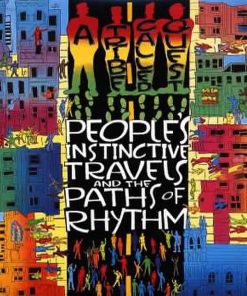Sufjan Stevens – Seven Swans LP Asthmatic Kitty Records
$ 22,98 Original price was: $ 22,98.$ 13,79Current price is: $ 13,79.
After completing the first installment of his planned series of 50 records — one album dedicated to each state in the U.S. — indie folk overachiever Sufjan Stevens returned with Seven Swans, a collection of stripped-down, introspective musings on life, love, and faith that chart the geographic location of the heart and soul. Many of these themes were dealt with eloquently on Greetings from Michigan: The Great Lakes State, presenting the singer/multi-instrumentalist as a first-rate interpreter of the human condition, as well as a gifted musician. The 12 tracks on Swans yield the same bounty, but with a leaner arsenal, due to Stevens‘ sparse arrangements and production from Danielson Famile mastermind Daniel Smith. Fellow Famile members Elin, Megan, David, and Andrew — who also appeared on The Great Lakes State — lend their vocal and percussion talents to the mix, resulting in a surreal campfire environment that’s part confessional and part processional. Beginning with the gorgeously titled “All the Trees in the Field Will Clap Their Hands,” Stevens saunters out of the gate with nary an overdub to be heard, letting the banjo lead the parade, slowly picking up piano, percussion, and the angelic voices of Megan and Elin before disappearing over the hilltop. He channels Bert Jansch on the love song “The Dress Looks Nice on You” and Eric Matthews on “To Be Alone With You,” striking a winning balance of ’60s British folk and indie Americana. Like the Violent Femmes‘ seminal pseudo-Christian masterpiece, Hallowed Ground, Seven Swans treats religion with simplicity and sincerity, approaching the subject with an almost feverish peacefulness. “Abraham,” “We Won’t Need Legs to Stand,” and “He Woke Me Up Again,” with its fiery, overdriven organ, are all effective tomes of the singer’s faith, but that faith can be tested. Stevens is quite aware of the dark, and no more so than on the Flannery O’Connor-inspired “A Good Man Is Hard to Find,” a first-person murder narrative that reveals a subtle current of menace only hinted at in the earlier portion of the record. Like faith, these songs require patience, as their almost mantra-like arcs take their time to fully form. By the time he reaches the spirited closer, “Transfiguration,” an affirming take on the Gospels that reaches an almost Polyphonic Spree crescendo, the listener has no choice but to conform — if only for the length of the record — to the writer’s unabashed spirituality, and at just under 45 minutes, it’s an easy choice to make. -All Music Guide
Fast Shipping and Professional Packing
We offer a broad range of shipping options due to our long-running partnerships with UPS, FedEx and DHL. Our warehouse employees will pack all goods to our exacting requirements. Your items are carefully inspected and secured properly prior to shipping. We ship to thousands of customers every day from all over the world. This demonstrates our dedication to becoming the largest online retailer in the world. Warehouses and distribution centres can be located in Europe as well as the USA.
Note: Orders that contain more than one item will be assigned a processing date depending on the item.
We will carefully examine all items before sending. Today, the majority of orders will be shipped within 48 hours. The expected delivery time will be between 3 and 7 days.
Returns
Stock is dynamic. It's not completely managed by us, since we have multiple entities, including the factory and the storage. The actual inventory can fluctuate at any time. It is possible that the stocks could be depleted after your order has been processed.
Our policy lasts 30 days. If you haven't received the product within 30 days, we're not able to issue a refund or an exchange.
To be eligible for a refund the product must be unopened and in the same state as when you received it. The item must be returned in its original packaging.
Related products
Vinyl
Vinyl



































